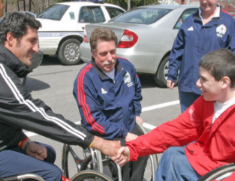Bob Hall
Competition | 1991

Hometown: Belmont, Massachusetts
Bob Hall is known as the father of wheelchair racing. All participants today who are involved in road racing have Bob to thank for breaking that barrier. Disabled at an early age by polio, he pioneered wheelchair racing when he participated in the Boston Marathon in 1975 at the tender age of 24. He had approached the Boston Athletic Association before the race, asking for permission to take part. Although not the very first wheelchair competitor (a Vietnam veteran by the name of Eugene Roberts had raced five years earlier), Bob was given permission and also told that if he could finish in under three hours, he’d receive a medal. Bob crossed the finish line at a mark of two hours and fifty-eight minutes. It was Hall’s time that got the attention of the Boston Athletic Association, helping them make the decision to finally recognize those in wheelchairs as official entrants.
In 1977 Hall smashed his course record to win with a time of 2:40: 10. This was also the year the Boston Athletic Association started the tradition of having the wheelchair athletes start 15 minutes (11 : 45 am) ahead of the non-disabled runners, thus avoiding the crowded start and possible injuries to non-disabled runners. This format has been sustained to this day.
Bob’s contributions to wheelchair racing didn’t end on the race course. In 1978 Hall designed his first racing wheelchair and founded a new company, Hall’s Wheels. It was there that he made handcrafted wheelchairs, measured to fit each customer, that weighed between fourteen and sixteen pounds—about half the weight of the wheelchair he’d used in his first marathon. “When I first started racing, I didn’t start out to be pioneer,” said Hall. “I did it purely for myself as an athlete to be the best of a given distance. As it played out, it became much bigger than that.” His innovative designs took wheelchair racing to another level. Modern day wheelchair athletes, whether they be on a high school track or Paralympic venue have Bob to thank for continually pushing the envelope to design a chair that would provide the athlete, along with dedicated training, the best possible outcome.



